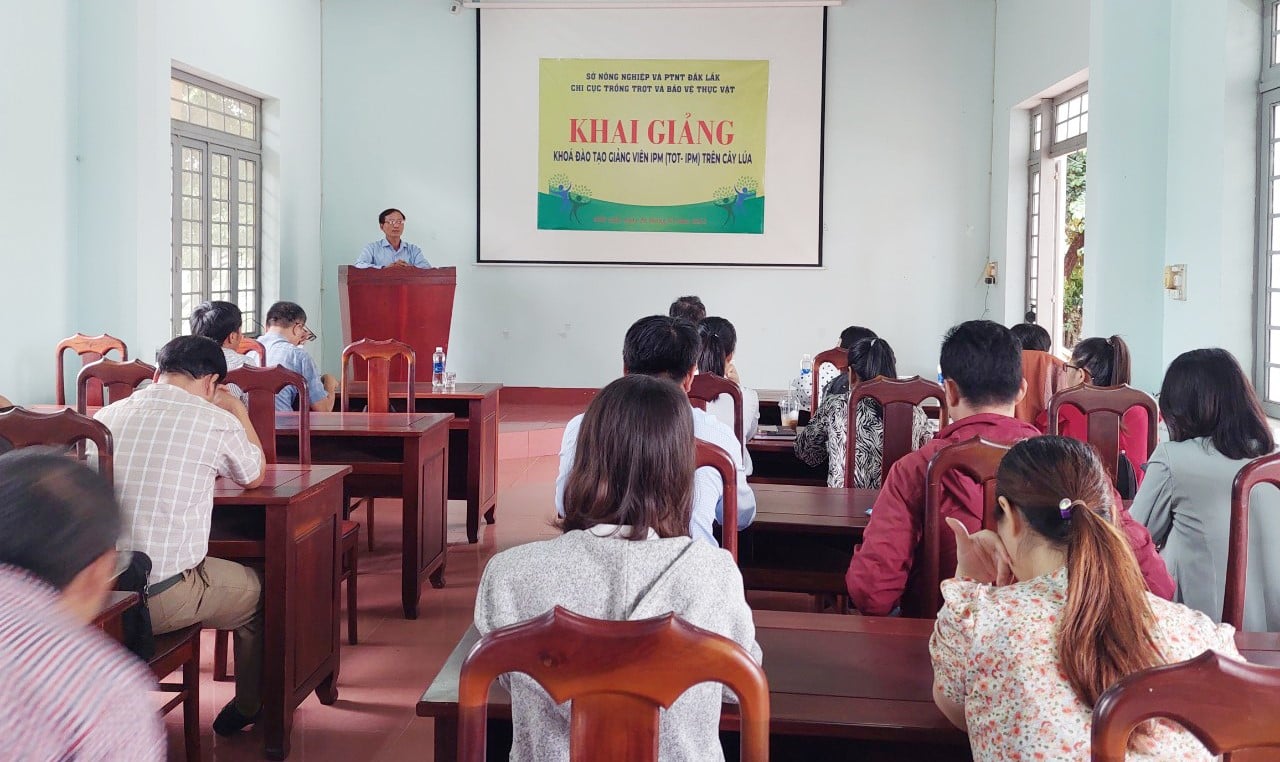November 22, 2025 | 22:00 GMT +7
November 22, 2025 | 22:00 GMT +7
Hotline: 0913.378.918
November 22, 2025 | 22:00 GMT +7
Hotline: 0913.378.918

Mr. Le Van Thanh, Director of the Sub-Department of Cultivation and Plant Protection of Dak Lak Province, opened the class. Photo: Quang Yen.
On July 26, the Sub-Department of Cultivation and Plant Protection of Dak Lak Province opened a course of training of trainers on IPM (TOT-IPM) on rice. The training course, with the participation of more than 20 staff from agricultural extension centers in districts and cities, aims to create a resource of trainers for the IPM program in Dak Lak province.
The objective of the training course is to enhance food security, food safety, and environmental sustainability through strengthening the capacity of plant protection systems.
According to Mr. Le Van Thanh, Director of the Sub-Department of Cultivation and Plant Protection of Dak Lak Province, rice is one of the main crops in agricultural production, contributing to ensuring social security. However, farmers have to face many risks of yield losses, such as extreme weather conditions and the impact of pest factors (insects, diseases, weeds, rats, etc.). Of which pests are the leading harmful factor.
To prevent harmful organisms, farmers still mainly rely on pesticides. The abuse of pesticides in the control of harmful organisms has caused many consequences, such as environmental pollution and the creation of antibiotic resistance in some harmful organisms, causing outbreaks of pests and diseases. In particular, the abuse of pesticides, which causes food insecurity in agricultural products, will be a threat to human health.
The national IPM program started in 1992. Over the past 30 years, 2,670 staff have been trained through TOT-IPM classes organized by FAO, the Plant Protection Department, and other units. Of which, FAO, in collaboration with the Plant Protection Department, has trained about 1,200 people, which is highly appreciated by the Ministry of Agriculture and Rural Development.

Trainees participate in the training course. Photo: Quang Yen.
"In order to disseminate the IPM program, attention should be paid to the work of developing the human resources of IPM trainers. IPM trainers will guide, suggest, and synthesize farmers' experiences and explain ideas to people with their trained scientific knowledge.
Consequently, this course aims to build a teaching staff to respond to the requirement of reinforcing local resources to implement the IPM program on key crops with high economic value and export potential in Dak Lak province in the 2021–2025 period," said Mr. Le Van Thanh, Director of the Sub-Department of Cultivation and Plant Protection of Dak Lak province.
The trainees will be trained on techniques for planting, caring for, and preventing major pests and diseases on rice and guidelines for safe and effective use of pesticides. At the same time, the learned knowledge is transmitted in an easy-to-understand and easy-to-apply way so that farmers can absorb and directly apply it to the agricultural production process, helping to improve productivity and quality of crops and minimize the use of pesticides.
The training course will be implemented for 14 weeks, spanning the whole summer-autumn rice crop of 2023, corresponding to the growth and development periods of rice and the harmful generation of pests.
Immediately after the opening ceremony, the lecturers and trainees conducted their studies and checked the location of practice.
Translated by Huyen Vu Thu

(VAN) Official Telegram No. 226/CD-TTg, issued on November 21, 2025, mandates enhanced management and utilization of national reserves to support flood response and relief efforts in the Central Region.

(VAN) The Politburo has demanded a high concentration of efforts on urgent relief tasks, ensuring absolute prevention of hunger, cold, and shortages of clean water or medicine among the population.

(VAN) Water resources during the 2025–2026 dry season in the Mekong River Basin basically meet domestic use and production needs, but localized shortages may still occur due to saltwater intrusion.

(VAN) Vietnam and Japan have committed to deepening cooperation on projects under the Joint Crediting Mechanism (JCM), improving waste management, and advancing the circular economy.

(VAN) Digital transformation is becoming a core driver of proactive, precise, and safer management of dams and reservoirs nationwide.

(VAN) This assistance supports people who temporarily relocate or evacuate, as well as communities affected by major storms from late September to now.

(VAN) Viet Nam will host the 8th ASEAN Heritage Parks Conference, bringing together over 320 delegates and reaffirming its role in regional nature conservation.